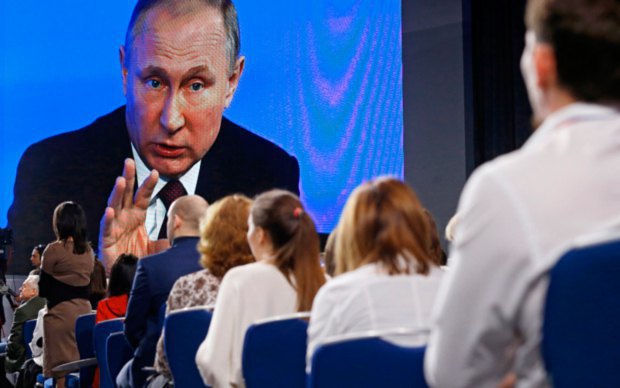
First, the propaganda is really successful, which is confirmed by the high ratings of Putin among Russians. From 60% to 85% of them support him and his policies, especially the foreign one. As we know, this propaganda has been quite successful abroad too.
Second, it would be a mistake to consider that its secret is only about total lies and demagoguery, although the scale of both is really impressive. In this, Putin's propaganda machine can compete only with the same machine of the Third Reich. But it's not only that.
One of the secrets of the success of Putin's propaganda is that it is multi-layered and multi-levelled. Almost everyone - from anarchists to monarchists- finds something of their own in the information flow that is pouring from the screens of Russian TVs, and which is broadcast online. Putin is anxious to "cover" virtually the entire political spectrum in Russia. And, to a large extent, he succeeds.
Putin's propaganda is absolute as it covers almost the entire population, but it is sufficiently differentiated in terms of satisfying the most diverse, at times opposing political views. It is designed for people who are completely primitive and poorly educated, as well as for the sophisticated intelligentsia.
For a significant part of the liberal intelligentsia, Putin is a liberal. If a famous actor, musician or writer does not publicly condemn his policies, Putin is ready to be friends with them, just like he was friends with musician Mstislav Rostropovich, singer Galina Vishnevskaya, writer Alexander Solzhenitsyn, musician Andrey Makarevich. Putin's friendship with Makarevich ended naturally in 2014, when the signer openly condemned the attack on Ukraine by Putin's Russia and the annexation of Crimea.
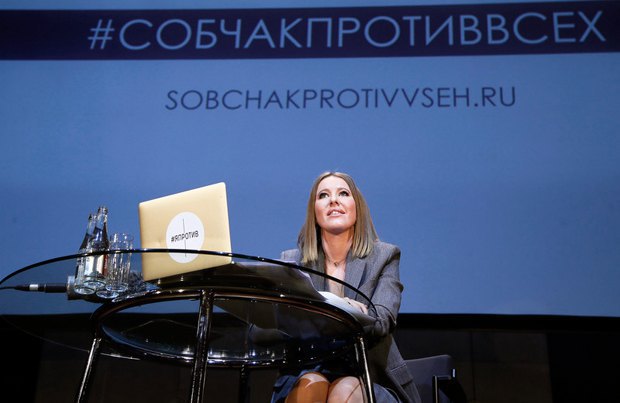
Putin made another gesture to please the liberal public when he invited glamorous journalist Ksenia Sobchak to take part in the 2018 presidential election. Using such PR campaigns, Putin constantly drives the wedge into the ranks of various opposition groups. Undoubtedly, Sobchak has become such a wedge in this case. Judging by how much time one of Putin's closest allies and his press secretary, Dmitriy Peskov, dedicated to this event, how tenderly he called her "Ksyusha", and also because of what Sobchak herself said ("Ksenia Sobchak in your ballot paper replaces the [missing] option "Against all," she wrote), she was given a full carte blanche to mobilize the liberal electorate for this election.
As a matter of fact, immediately after her nomination was approved personally by Putin, she wasted no time tackling a problem which is important for him, which is to raise the turnout: "Are the boycott of the election and non-participation in them if prominent opposition figures – first of all, Aleksey Navalny - fail to get registered as candidates a correct way to demonstrate our disagreement? I do not think so."
Ksenia Sobchak's nomination as a presidential candidate is a brilliant idea: part of the undecided democratic public, which was previously hesitant whether it should go to the polls in March 2018, especially after Aleksey Navalny was blocked from running, will certainly cast their ballots. Considering that about a third of Russian voters do not usually vote in presidential elections, they can ensure a rather large increase, if they do go. Certainly, it will be not so much up to voters but to election organisers to decide how much each of the candidates gets.
Anyway, Sobchak's next show is just a cog in a huge wheel of Putin's propaganda. What is more, the entire political system of today's Russia, its political institutions, which are just complete imitations, are a global mechanism of its propaganda, designed to deceive people not only in the Russian Federation but all over the world.
For most Russian patriots, Putin is a patriot. Whereas before 2014 the most radical part of the patriots doubted this, now they are also convinced of this, and it was not difficult to achieve. A patriot with imperial ambitions is quite simple. If the xenophobia of the supreme ruler is supplemented by external expansion, no doubt, he is one of us!
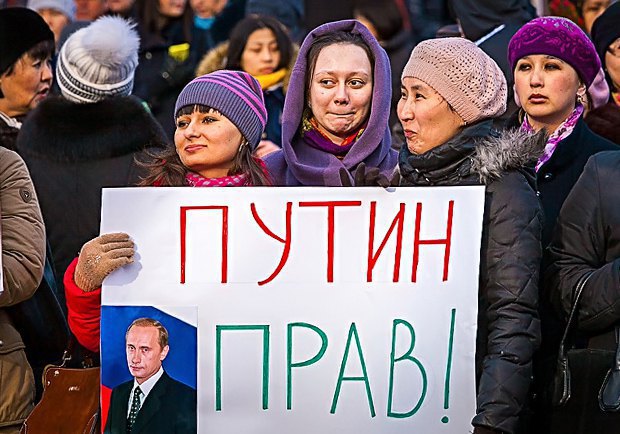
For Russian (and not only Russian) leftists, Putin is a leftist. Although he is hiding this carefully, in their opinion (however, some liberals are of the same opinion about him). Over almost 20 years of his reign, the leftists have been struggling to catch a glimpse of his "leftism" even where there is none. For his part, he tries not to disappoint them, regularly sending them relevant signals. These signals, however, are subtle and expressed mainly in the deft use of Soviet symbols, like the music of the Soviet anthem and its somewhat modernized text, or the red banner of the army.
Actually, this is as much "leftism" as Putin has. Unless, of course, we take for it the traditional Russian imperialism, which is characteristic of both the Russian Empire and the USSR. But his supporters from the left camp, nevertheless, manage to see his "communism" even though there is none.
For example, just several years ago a former irreconcilable critic of "Yeltsin's anti-popular regime", Viktor Anpilov, urges his comrades at the Forum of the Left Forces to "take a closer look" at Putin who was "taking the left turn". There is nothing to say about the parliamentary Communist Party of the Russian Federation which Putin had bought by that time. The party has long been a steady pillar of his support...
A strong card in Putin's propaganda is his friendship with Jewish businessmen: the Rotenberg brothers, billionaire Viktor Vekselberg, former journalist and current Rosneft co-owner Mikhail Leontyev and many others.
Putin's friendship with the Jews is an important trump card in his sleeve, for anti-Semitism is a synonym for fascism for the intelligentsia, most of whom hardly know the history, like the rest of society. The majority of the Russian intelligentsia does not know that there was practically no anti-Semitism either in fascist Italy or in Franco's Spain. For them, everything is as simple as for most patriots, just the exact opposite. If there is state anti-Semitism, there is fascism. If there is no state anti-Semitism, there is no fascism.
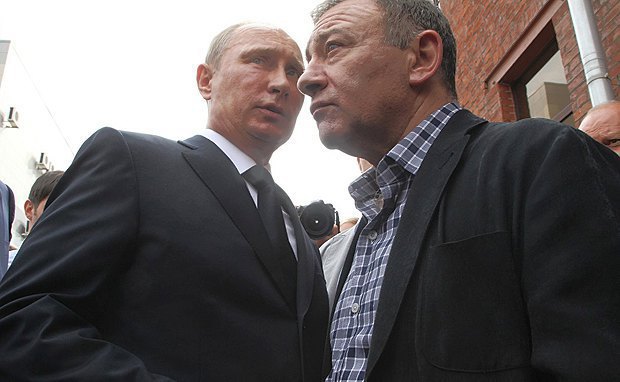
And the facts that some representatives of the top establishment of Putin's Russia occasionally make public anti-Semitic statements, as the deputy chairman of the State Duma representing the ruling United Russia party, Peter Tolstoy, did recently, and lower house speaker Vyacheslav Volodin, who is formally the third person in the state, defended him, mean nothing for pro-Putin intellectuals both in Russia and in the West. Nothing more than an unpleasant incident.
The main component of Putin's propaganda is the leader's personal PR. For tough guys and sentimental ladies, he's a tough guy. For intellectuals, he is an intellectual. He also tries to be on the same foot with workers. Putin's propaganda is aimed not only at different social groups, people of different, often opposing political views, but also of different ages.
For young people, Putin acts as a friend of rockers and rock-n-rollers. Commercial advertisements by large Russian companies such as mobile operators or Internet service providers address young people, using slogans such as "you choose", "this is your choice". Thus, young people are made to believe that they have a choice.
In fact, there is no choice. Especially among young people. It is increasingly more difficult and expensive to receive higher education in Russia. But even after graduation, young people usually work (if they work) not by their profile but doing the jobs they are not really interested in but which make it possible for them to make ends meet. However, a virtual illusion of choice is thoroughly supported, including with the help of commercial advertising.
Particular attention in Putin's propaganda is paid to older people. Nostalgia for the Soviet past is being cultivated with them in mind. Putin exploits it, emphasizing "the good things that were there." However, we must pay tribute to his firm class position: we will never find free education, or free medicine, or free housing in his list of "what was good in the USSR". And that is true. It would be strange if a representative, advocate and exponent of the interests of big capital suddenly started talking about what worries the poor, that is the majority of the Russian population. Talkative Putin never mentioned these things in almost 20 years of his stay at the top of the Russian Olympus.
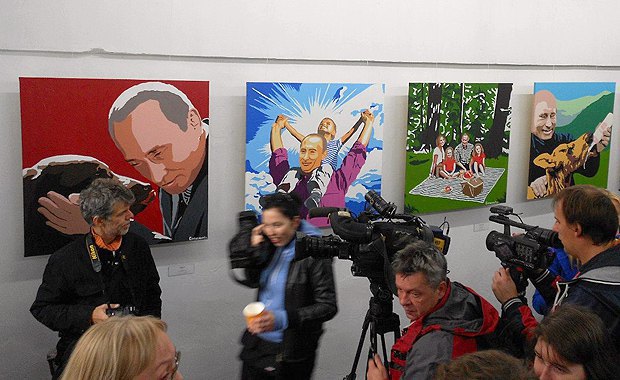
Exhibition on Putin's 60th anniversary "President. A kind-hearted man" 2012
For Putin, "the good things that were in the USSR" exclusively refer to the greatness of the state, the power of its army and military victories of the past. Psychologically, that would do for people who believe that they have lost their country.
Putin actively supports the revanchist sentiments in the public, warming them up and preventing them from turning cold. Largely thanks to him, they actually exist because we see how quickly the mood of Russians changes depending on the change in the information agenda of Russian TV channels. If he suddenly had a change of heart, the revanchist, great-state agenda would leave the Russian screens. And in a few years, citizens would have forgotten about these complexes. But this will not happen because in this case they would be left alone with their problems, with debts to banks, with the fact that there is no time to have a life and they would certainly understand that the authorities were to blame for this ... Therefore, while Putin is in charge of Russia, the great-power chauvinism and revanchist agenda will always be at the centre of attention on Russian TV.
Putin's propaganda takes into account regional specifics. Let's take Moscow, the most important region for the Kremlin, if only because people behind the wall are well aware that all revolutions happen in capitals. In addition, they are certainly familiar with real statistics, which shows that the active political minority representing the opposition in the capital at times exceeds the same pro-Putin active minority. In this case, I am talking about an active minority, meaning those who independently, without an administrative resource, are able to come to the square to defend their political beliefs.
So, for example, in February 2015, according to the organizers, about 30,000-35,000 people attended the Antimaydan rally. To compare, an opposition march against political terror, which was held in response to the murder of Boris Nemtsov, gathered about 100,000 people. And this happened even though the administrative resource was used in full to convene the Antimaydan, while there were no directed efforts behind the march to remember Nemtsov - someone just said online when and where, and people simply came ...
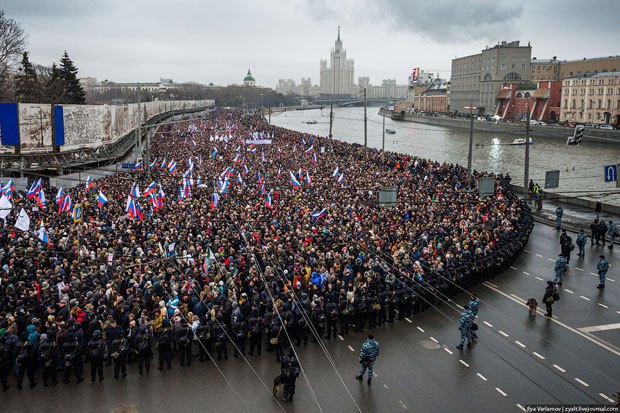
So, the authorities recently launched another propagandist project in Moscow. Stands saying, for example, "Moscow creates" were placed in railway cars and on subway stations, in the streets of the city of 12 million people. One of the stands has a photograph, for example ... of surgeon Pirogov, who was born in Ukraine, in Vinnytsya and later buried there ... in 1881. Another similar stand has the portrait of playwright Alexander Ostrovsky, who passed away also in the 19th century, in 1886. The stand entitled "Moscow conquers" displays a photo of Soviet cosmonaut Svetlana Savitskaya, who performed her space exploits more than 30 years ago. That is, also in another era and in another country. However, the slogans for this project are written exclusively in the present tense: Moscow did not "conquer", but "conquers", did not "create" but "creates" and so on.
Not to mention the fact that many outstanding people of science, culture and sports of the past, whose names and images were used for this PR project, have vague relationship to Moscow at all. I have already mentioned Pirogov. Another celebrity of the past, football goalkeeper Lev Yashin, whose name and photo were also used in the project, and who also died too many years ago, was born, grew up and began his football career in Leningrad...
It is noteworthy that there are no contemporaries who have accomplished something worthy on these posters. Modern Russia has not produced anything worthy of mention, except for wars, hatred and deceit, has not nominated any worthy citizens. But it's not only that.
For an average citizen, as a rule, who is poorly versed in history, this propaganda project presents the dignitaries of the past and their achievements as their contemporaries and today's achievements respectively. Cooked like this, a citizen does not know where the story (which was badly distorted as a rule, of course) ends and a modern day begins.
History and modernity, their own and others' heroes are poured into a common stockpot filling Russian hearts with pride thanks to Putin's skilful PR people…
All this, of course, is a virtual opium for the people, leading them away from the abominable reality into a world of dreams and illusions. But it works.
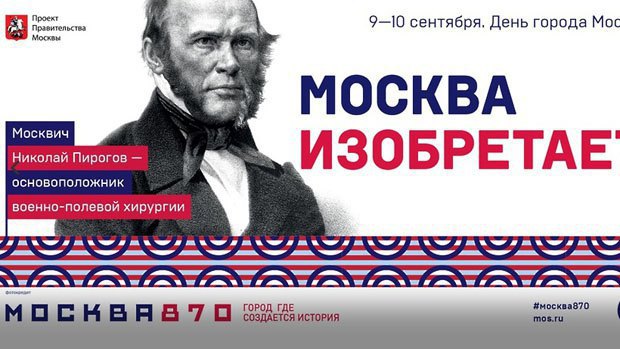
Such an incorporation of history in today's reality is Putin's "trick". Whereas other states, the former republics of the Soviet Union, began to create (recreate) their own national history after its collapse, with their own pantheon of heroes, Putin's Russia decided simply to recreate the imperial tradition by merging it with the Soviet past.
Against the backdrop of a rather blurred ideology of the 1990s, when the prevailing idea was that the Soviet period was a certain detour into an impasse from the main path which all other nations took, the creation of a single linear history by Putin ideologists - Rus-Russia-USSR-new Russia – was like a balm on the wounds of the post-Soviet Russians. The great past was restored in its rights and organically entered the present, promising radiant prospects in the future.
Read:
How the world should react to Russia's terrorist-destructive efforts
This "future", as an attempt to repeat the "great" past, began in 2014 by an attack on Ukraine. This "future", implicated in the worst examples of the past, has no prospects other than bloody wars and, ultimately, the inevitable defeat of the regime.
Most Russians have not understood this yet, but they have already felt something. And these feelings (for example, a sharp decline in the already not very high standard of living of most of them) were reflected on demography, the most accurate indicator. Since 2016, the Russian population has been declining again: from 8,000 to 104,000 people during eight months of 2016 to 2017. You cannot fool the nature with propaganda.








